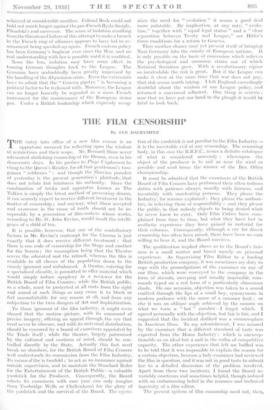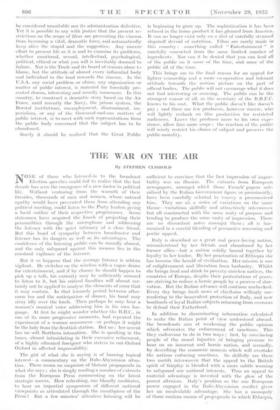THE FILM CENSORSHIP
By IAN DALRYMPLE
THE entry into office of a new film censor is an opportune moment for reflecting upon the wisdom of restrictions and their scope. Mr. Bernard Shaw never advocated abolishing censorship of the Drama, even in his democratic days. In his preface to Plays Unpleasant he clung to the Queen's Reader, for all that gentleman's two- guinea " robberies " : and though the Shavian paradox of yesterday is the present generation's platitude, that does not refute but reinforces his authority. Since the combination of tricks and apparatus known as The Talkies is simply the latest method of presenting drama, it can scarcely expect to receive different treatment in the matter of censorship ; and anyway, what Shaw accepted and overcame in the cause of truth should not be in- superable by a generation of film-makers whose works, according to Mr. St. John Ervine, would insult the intelli- gence of a child of ten.
It is possible, however, that one of the contributory factors in Mr. Ervine's contempt for the Cinema is just exactly that it does receive different treatment : that there is one code of censorship for the Stage and another for the Screen ; the assumption being that the Theatre serves the educated and the refined, whereas the film is available to all classes of the population down to the crassly ignorant and unbalanced. A theatre, catering for a specialised clientele, is permitted to offer material which would simply induce apoplexy in a reviewer for the British Board of Film Censors; while the British public, as a whole, must be protected at all costs from the sight and sound of such things as may cause it to blush or feel uncomfortable for any reason at all, and from any subjection to the twin dangers of Art and Sophistication.
To those ignorant of the film industry, it might seem absurd that the motion-picture, with its command of precise imagery, offering an appeal through, the eye that need never be obscure, and with its universal distribution, should be censored by a board of examiners appointed by the Ttade itself ; while the theatre, largely patronised by the cultured and cautious of mind, should be con- trolled directly by the State. Actually this fact need break no slumbers, for the British Board of Film Censors well understands its commission from the Film Industry. its.raison-d'etre is twofold : to act as an insurance against outside supervision, and to maintain the Standard Rules for the Entertainment of the British Public—a valuable yardstick for the Producer. Consequently, the Board selects its examiners with care (one can only imagine from Tunbridge Wells or Cheltenham) for the glory of the yardstick and the survival of the Board. The opera- tion of the yardstick is not peculiar to the Film Industry— it is the inevitable evil of any censorship. The censoring body, in this case the B.B.F.C., issues a definite catalogue of what is considered unseemly : whereupon the object of the producer is to sail as near the wind as possible and scud home the winner of the Box Office championship.
It must be admitted that the examiners of the British Board of Film Censors have performed their often tedious duties with patience always, usually with fairness, and invariably with unrelenting purpose. They please the Industry, for reasons explained : they please the authori- ties, in relieving them of responsibility : and they please the public, in that nobody objects to being denied what he never knew to exist. Only Film Critics have com- plained from time to time, but what they have lost in aesthetic experience they have gained in material for their columns. Consequently, although. a cry for direct censorship has often been raised, there have been no cars willing to hear it, and the Board .survives.
The qualification implied above as to the Board's fair- ness is a small matter and based merely on personal experience. As Supervising Film Editor to a leading British production company, it was sometimes my duty to cope with the promulgations of the examiner on any of our films, which were conveyed to the company in the form of staccato, sweeping and usually impossible com= maids typed on a red form of a particularly obnoxious shade. On one occasion, objection was taken to a sound emitted through the lips of a small boy, synonymous in modern parlance with the name of a summer fruit : or else it was an oblique angle achieved by the camera on what we term a " hot " number—I forget which. I agreed personally with the objection, but fair is fair, and I suggested that the incident disliked was a commonplace in American films. To my astonishment, I was assured by the examiner that a different standard of taste was expected from the Home Industry : which is unexcep- tionable as an ideal but a nail in the coffin of competitive capacity. The other experience that left me baffled was to be told that it was impossible to explain the reason for a certain objection, because a lady-examiner had reviewed the film in question, and it was not in good taste to submit her to a detailed discussion of the problem involved: Apart from these two incidents, I found the Board in- variably courteous and sometimes helpful, though imbued with an embarrassing belief in the resource and technical ingenuity of a film editor.
The present system of film censorship need not, then, 'be'considered unsuitable nor its administration defective. Yet it is possible to say with justice that the present re- strictions on the scope of films are preventing the cinema from becoming a vital, dramatic force, and automatically keep alive the stupid and- the suggestive. Any sincere .effort to present life as it is and to examine its problems, whether emotional, sexual, intellectual, psychological, political, ethical Or what you will is inevitably doomed to failure. Nor is the Trade and its hoard of censors alone to -blame, but the attitude of almost every influential body and individual in the land towards the cinema. In the U.S.A. any social problem or abuse, any organisation or matter of public interest, is material for forcefully pre- sented drama, interesting and usually innocuous. In this country, to construct a dramatic story based on the Air Force, until recently the Navy, the prison system, the Borstal institutions, unemployment, disarmament, im- perialism, or any of the thousand-and-one matters of public interest, is to meet with such representations from the public body concerned that the subject has to be abandoned.
Surely it should be realised that the Great Public is beginning to groW Up. The sophistication it has been refused in the home product it has gleaned from America. It can no longer exist only on a diet of carefully steamed slopstuff devoid of nutrition. • Films arc rarely made in this country something called " Entertainment " is carefully concocted from the same limited number of ingredients. Nor can it be -denied that you can feed all of the public On it some of the time, and some of the public all of the time.
This brings me to the final reason for an appeal for lighter censorship and a more en-operative and tolerant attitude towards the motion picture on the part of official bodies. The public will not encourage what it does not find interesting or amusing. The public ean be the strongest censor of all, as the secretary of the B.B.F.C. knows to his cost. What the .public doesn't like doesn't pay ; and there are few producers, however sincere, who will lightly embark on film production for restricted audiences. Leave the producer more to his own expe- rience, allow him more scope : the reaction of the public will wisely restrict his choice of subject and preserve' the public morality.













































 Previous page
Previous page